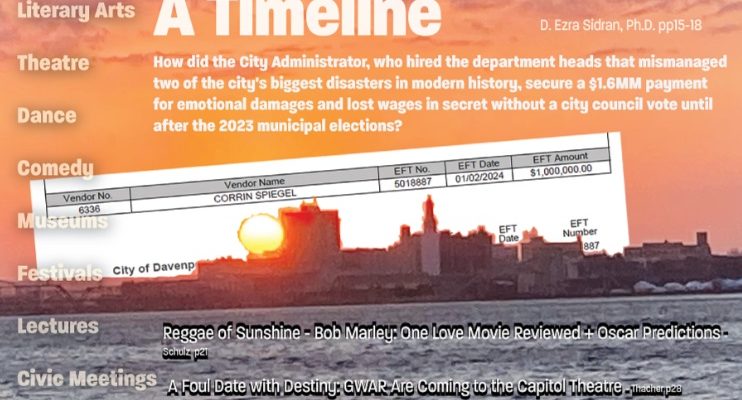Podcast: Play in new window | Download | Embed
Subscribe: Android | Blubrry | Podcast Index | RSS
River Cities’ Reader publisher Todd McGreevy talks with WQUD GM Aaron Dail and Pat Jones, Sancho Panza to Dail’s Don Quixote, re recent highlights, both online and within Issue N° 1019. Joining the two for half of the discussion is Li Arellano, the former mayor of Dixon, Illinois, and one of three Republicans vying for the open 37th District state Senate seat at present. (The other candidates are Chris Bishop, former Dixon teacher and a member of the Dixon City Council, and Tim Yager, a member of both the Henry County Board and the Henry County Farm Bureau.) McGreevy solicits Arellano’s opinion re the recent state efforts to push Donald Trump off their ballots — since decided by the Supreme Court to be the provenance of Congress, not the states — and both question the legality of such efforts, given that (to date) Trump hasn’t been convicted of any federal offense that would mandate such pre-emptive actions.
The Decline and Fall of Davenport, Iowa? A Timeline
Dr Ezra Sidran lays it out in his header: “How did the City Administrator, who hired the department heads that mismanaged two of the city’s biggest disasters in modern history, secure a $1.6 million payment for emotional damages and lost wages in secret without a city council vote until after elections?” Much like his previous month’s timeline on the collapse of the Davenport Hotel (324 Main Street Disaster Timeline and Receipts), Dr Sidran filed a bunch of Freedom of Information Act requests, and from them was able to determine the timeline of city-administrative chicanery that, in the latter instance, led to a number of officials resigning their posts and receiving pay-outs that were kept secret from citizens until the last possible moment. Sidran provides us a wealth of instances to keep in mind the next time we get an opportunity to register our grievances — which, if Mayor Mike Matson’s embargo on public commentary in open-session committee meetings holds, may well be the next election cycle.
The Bill of Obligations: The Ten Habits of Good Citizens by Richard N Haass
Lydia Electrum’s review of The Bill of Obligations lauds the principles espoused by Haass. As concerns his fidelity to those principles, however, Haass — who was president of the Council on Foreign Relations from July 2003 to June 2023, prior to which he served as Director of Policy Planning for the United States Department of State (established by George F Kennan in 1947 as the Cold War was settling in) and a close advisor to Secretary of State Colin Powell under President George W Bush (not so plum a posting, that) — has much to teach us as an object lesson in how compromised one can become in trying to keep them straight, and not so much the latter-day Walter Isaacson-style Wise Man policy Moses with tablets of wisdom to lug down Mount Sinai and break upon the skulls of the uneducated, doltish masses. One recalls the hair-splitting of arguments Haass performed on NPR’s All Things Considered for Robert Siegel (Richard Haass: ‘I Did Not Believe in The Iraq War’: NPR, 13 May 2009), wherein he described himself as “60 percent against going to war in Iraq” — the remaining 40 percent of his doubts about his doubts being enough to keep him from resigning in protest, evidently. In the course of his career, Haass had wandered into moral territory wherein the maps had fallen off the maps; how he made his way from one end to the other might have made for a more honest, less equivocal book.
Buried Stories: D D Palmer (1845-1913)
Bruce Walters’s analysis of Davenport’s arguably most important contributor to world knowledge, D D (Daniel David) Palmer, gains in esteem in everyone’s eyes due to Walters’s portrait of the man as a member of some lost Hasidic sect of Judaism. Palmer, whose bust sits atop Brady Street Hill, was a Davenport citizen who started in the dubious field of magnetic healing, and discovered, in his stumblings, upon a more enduring contribution to medical thought in spinal adjustment; and his founding, in 1897, of the Palmer School and Cure in Davenport, later renamed Palmer College of Chiropractic, nailed his discovery into bedrock. Walters doesn’t say anything about the supposed rivalry that developed between D D Palmer and his only son, B J (Bartlett Joshua) Palmer, to the extent that the son was alleged to have run over his father during the homecoming parade for the Palmer School of Chiropractic in 1913, which led to the injuries that later claimed the elder’s life after his return to his home in Los Angeles. Whether D D Palmer died of typhoid fever, as is documented, or he was the victim of either outright patricide or a faulty clutch, only adds to the level of interest that the Palmers bring to their story; and Palmer College continues to this day to invite, and graduate, students from all over the world.
Reader Events Calendar: Your Key to Quad Cities’ Culture
Everything that’s worth seeing and/or doing in the QCA.

